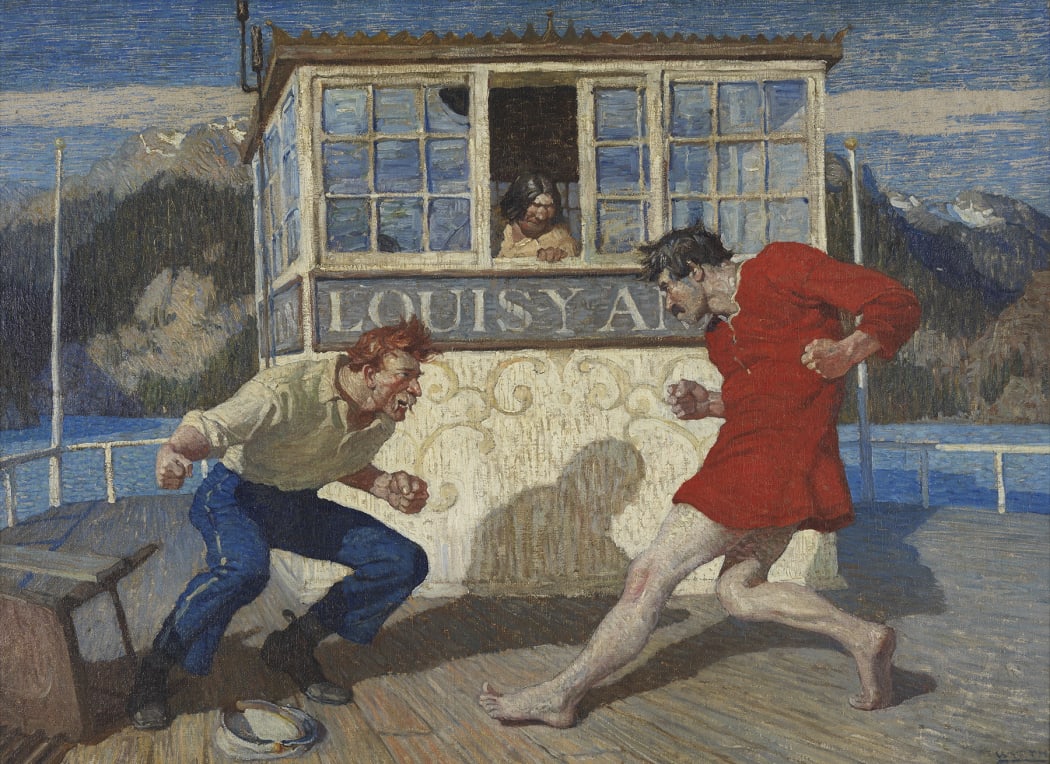
"Captain Bill stared at him with his indolent gray eyes, then put his hands behind his head, yawned widely, and shook his head sadly"-thus did Roy Norton set the scene which N. C. Wyeth would illustrate for a 1916 issue of Collier's Weekly.
"Charles," he said, "that's impossible! You've sure been drinkin' too much. You told us yourself when you come aboard that you didn't have nothin' on you-couldn't even pay your fare down this mighty Yukon ditch. My boy, the evils of intemprunce'll get you yet if you don't cut out this fiery devil that you puts in your mouth to steal away your brains. Go back, Charles. Go back to bed and sleep it off."
But would you think a man like Three-Fingered Charley would heed that sage advice? Readers of "Captain Bill" in Collier's wanted action, and Three-Fingered Charley delivered:
Three-Fingered Charley stood aghast for a moment, then made a mad lunge for Captain Bill's throat, but the latter saw it coming and was prepared. From the hogchains that vibrated on their side stanchions aft until they almost fell overboard, and from the stern forward to the back of the pilot house they danced and whirled and struck an howled-Three-Fingered Charley yelling venomously, Captain Bill whooping with gleeful vehemence-and then came to final stop because Charley was no longer in a position to continue, having been knocked flat on the deck and with Captain Bill cheerfully seated on his chest and pinioning him helplessly.
Captain Bill comes out on top:
"Psho! Ain't that too bad now. Who'd think a few drinks would give a feller fishhooks in his noodle like that?" plaintively remarked Captain Bill.
This is the closing vignette in the story of frontier life in Alaska, "when Alaska was mostly a white spot on the maps, neglected, unknown, and inhabited by wolves, bears, natives, dogs, and traders, a fleabitten tribe in winter and a mosquito-ridden one in summer."
Our hero: "Captain Bill Smith, recruited from the headwaters of the Missouri River, ran the palatial trading steamboat Louisy Ann." Alaska was "a thousand miles from anywhere. It was a fine country for . . . murderers, because there was no law and not the slightest inquisitiveness among those wanderers who dwelt and roved thereinches."
In short, it was just the stuff that N. C. Wyeth best liked to illustrate. His first cover, for the Saturday Evening Post, showed a cowboy riding a bucking bronco, and though his subjects weren't always the West, they were, with great reliability, the cowboy sort. Loners of bravery and sometimes moral laxity, drinking, hunting, and fighting to stay alive on the edges of the American frontier.
Few mainland Americans today could tell you that Alaska celebrates sixties years of statehood this year. But a full century ago, the Territory of Alaska was of central importance to the national imagination. The United States had purchased the territory in 1867, and by the 1890s the same sort of gold rush that helped settle California also drew adventurers and prospectors toward the Yukon. But the crushing extremities of distance and cold prevented Alaska from being settled at the same haste as the Golden State. In 1912, it became an official territory of the United States, a designation it would hold until 1959, when it became a state. In the mid 1910s, the excitement over territory-hood joined with the lingering Wild West quality of life in Alaska-a quality that was increasingly scarce in the traditional West, since the official close of the frontier in 1890. The result was a mild case of Alaska Fever, and the pulp magazines rushed to satisfy the appetite. Magazines like New Story, which promised just what the masthead ordered, put polar bear fights on their covers while stories of ice-floe fisticuffs filled their pages. N.C. Wyeth, still at a young age and one of the most sought-after illustrators in the countries, rose his paintbrush to the challenge.
Lest we give the impression that the tale of Captain Bill and his odd-digited foe was exclusively one of dust-ups, the story has a healthy mix of frontier dialect and a Tom Sawyer-esque vindication of wits. Three-Fingered Charlie, hoping to keep his gold discovery entirely to himself, begs a ride from Captain Bill on his ship, the Louisy Ann, and cries poor to gain passage for free. Captain Bill outsmarts Charlie, lifts the loot, and finally gives back a healthy portion to the defeated prospector, having taught him a lesson more valuable than gold dust. While the pivotal moment of the story turns on manly combat, it is nonetheless a classic American short story of winning justice through wits, in a line with Mark Twain, O Henry. Wyeth, for his part, captures all the action, showing us the wildmen of the North, parrying in much the same feints and lunges as the dueler swordsmen that Wyeth often painted in the same years.
The Louisy Ann—funny name for a ship that's made its way all the way up the Missouri to the Bering Strait—is on clear view, as is the captain's fallen hat and Charlie's besotted dressing gown. But take care and count the fingers—I suppose Three-Fingered Charlie was lying about that, too.
Alaska: 60 years a state; 107 years since becoming a territory — but who's counting?

